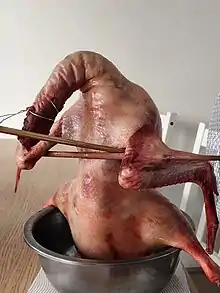Nanjing salted duck
Nanjing salted duck (Chinese: 盐水鸭) is a local duck dish from Nanjing, China.[1][2] The history of the dish goes back hundreds of years, possibly to the 14th century, but it grew more famous during the Qing Dynasty.[3] The tender white duck-meat has some fat but is not greasy, and in presentation the dish is fragrant and often crispy. Nanjing salted duck prepared shortly before or after mid-Autumn is reputed to taste the best, because of duck production during the sweet osmanthus[4] blooming season (osmanthus may be added to the spice mixture particularly in those months). Sometimes the seasonal version of the dish is called "osmanthus duck".[5]
 | |
| Alternative names | Chinese: 盐水鸭 |
|---|---|
| Type | Duck dishes |
| Place of origin | China |
| Region or state | Nanjing |
| Associated national cuisine | Jiangsu cuisine |
| Similar dishes | Peking duck |
Nanjing salted duck is often regarded as a dish to share. As a popular pastime, whether locals on family holidays or simply daily visitors, people in Nanjing often take to the streets to buy Nanjing salted duck.
Nanjing is a culinary centre noted for its Jinling dishes,[6] especially quality ducks and a whole variety of duck dishes.[7] Over 100 million ducks per year are eaten in the city of 8 million.[8]
Place of origin
Cooked duck products are widely popular in China for their rich nutritional value as much as for their flavour, and are especially so in Nanjing.[9] This ancient city on the southern bank of the Yangtze River has a long history of duck farming, with some historians even suggesting that ducks were raised as livestock in the old city of Nanjing more than 2,000 years ago.[5] In the early Ming Dynasty (1368-1644), the salted duck was an essential part of many Nanjing families’ daily meals, and even the emperor of the time, Zhu Yuanzhang, was fond of it.[5]
Origin, according to tradition
One legend holds that when Zhu Yuanzhang was the emperor (with Nanjing as the capital in the 14th century), there was a dispute of sorts, and an edict was issued to kill all the roosters in the city. This solved a noise problem, but the result was no chicken to eat. The people of Nanjing had to eat duck instead, which gave rise to the prominence in Nanjing of duck dishes like Nanjing salted duck.[10] Other accounts claim that Nanjing was famed for duck dishes centuries earlier, dating even to the Southern Dynasties (420~589 A.D.).[11][12]
During the Qing Dynasty (1644-1911), near the Fuzimiao, the examination venue for the imperial examinations, major restaurants and teahouses specialised in preparing brine duck to satisfy the taste buds of students.[3]
Gastronomical records
The gourmet entry for Nanjing salted duck was recorded in Tongzhi Zhang’s List of Jinling’s Delicacies published in February 1947, one of the 61 entries in his selection.[13] These 61 gourmet entries cover a wide range of local delicacies that Tongzhi Zhang has tasted in Nanjing during his lifetime, including but not limited to raw materials, processed foods and cooked dishes.[13]
Tongzhi Zhang (1875-1948), who came from the present Luhe district of Nanjing, was not only a highly respected scholar, educator, poet, calligrapher and painter in contemporary China, but also a gourmet.[13] The fall of the Qing dynasty in 1911 forced Tongzhi Zhang to leave officialdom for Nanjing, where he spent the rest of his life.[13] List of Jinling’s Delicacies is included in Nanjing wenxian (Nanjing documents), then edited by Tongzhi Zhang himself, as a food review that is a testament to his ability to console himself by sampling the local cuisine of Nanjing.[13] In addition to Nanjing salted duck, many of the 61 gourmet entries recorded by Tongzhi Zhang are still representative of Nanjing’s local specialties these days.[13]
According to Tongzhi Zhang’s comments, for the meat of the Nanjing salted duck to be fatty enough, the ducks used for cooking must be carefully reared, with particular attention to the feed fed to the ducks.[13] The distinctive flavour, perfect tenderness and moderate saltiness of Nanjing salted duck are all due to the right amount of time and salt used in the curing process.[13] This is also due to the moist heat cooking technique used in the production of Nanjing salted duck, which makes the duck meat to be fleshy and firm and full of juices.[5] It is therefore crucial to control the temperature during the cooking process of the duck, otherwise neither the aroma nor the taste of the duck meat will reach the standard value, and it may even be said to be irrelevant to the quality of authentic Nanjing salted duck.[13] Finally, Tongzhi Zhang also mentions the reputation and popularity of the salted duck produced and sold by Hanfuxing Shop in Nanjing because of its rich and attractive aroma and fatty but not greasy taste.[13]
Cooking method

The duck, with wings and feet removed, is cleaned and drained. Spices and recipes vary, but a simple approach is to rub pepper into the body with more stuffed inside. The duck is cooked in a pot, pickled (1–2 hours in summer, 4 hours in winter), and hung to dry in a well ventilated area. The duck is then simmered in water with ginger, onion, and star anise. Finally, the duck is cut into strips.
Flavour and production techniques
Among the many traditional meat products in China, Nanjing salted duck is one of the few processed meat products cooked at low temperatures.[14] As a famous local appetiser,[5] Nanjing salted duck is well known for its tender and flavourful taste and meticulous processing.[14] Although Nanjing salted duck may appear to be an ordinary dish at first glance, its unique and rich flavour has made it a cornerstone of Jinling cuisine, thus not only rivalling Peking duck in terms of taste,[5] but also enjoying similar popularity and reputation as Peking duck.[15] Jinling cuisine is the ancient Chinese name for Nanjing cuisine, which is subordinate to Jiangsu cuisine, one of the eight major cuisines of China, and can be traced back to the Six Dynasties (222-589 A.D.).[5]
Cooked duck products are a popular food not only in China, but all over the world, and Nanjing salted duck is one of the most well-known ones.[16] Nanjing salted duck is cooked in the traditional Chinese brine method at low temperatures, and its tender and flavourful taste has made it a world-famous local specialty.[16] In China, brine is recognised as a means of treating raw meat with only a bloody smell, and it is widely used in the preparation of various cooked meat products with traditional characteristics.[16] As a traditional cured meat cooked with this technique, the flavour is the most important sensory quality and characteristic of Nanjing salted duck.[16] Due to the high unsaturated fatty acid content of the duck, the oxidation and degradation of the fat are essential for the formation of the perfect taste of the duck meat, which is also the key to Nanjing salted duck’s unique flavour.[16] The production process involves a series of steps such as dry-curing, salting, roasting and boiling,[16] all of which are essential,[15] as they together contribute to the oxidation and degradation of the fat.[16] When the products of fat degradation are increased, the typical and distinctive flavour of Nanjing salted duck is created and enhanced.[16]
The dry-curing process makes an important contribution to the degradation of duck fat by accelerating its oxidation to a great extent throughout the production process of Nanjing salted duck.[16] During the curing process, it is better if the whole duck is completely immersed in the aged brine, which is the salting step, and this is why other categories of cooked duck products never reach the flavour and quality standards of the Nanjing salted duck.[16] The optimum ageing time for duck is 24 hours, which is more conducive to the processing and subsequent flavour formation of the salted duck and is also more suitable for real-life production.[15] The ageing step often follows the brining (salting) and is somewhat similar to the processing of ham.[15] As the ageing time increases, the water content of the duck meat decreases, so the dehydration caused by excessive ageing time can seriously affect the water locking capacity of the duck meat, which is detrimental to the oxidation of fat and thus hinders the formation and development of the flavour of Nanjing salted duck.[15]
Honorary achievements
- In 2012, Nanjing salted duck was listed as a Chinese geographical indication agricultural product.[5]
- In 2014, Modern Express, a local newspaper in Nanjing, launched a campaign in which Nanjing salted duck was named as one of the eight most popular dishes in Nanjing.[5]
- In 2014, during the Youth Olympic Games held in Nanjing, Nanjing salted duck was included in the athletes' diet menu, thus giving athletes from all over the world the opportunity to taste this very representative Jiangsu specialty.[5]
See also
References
- Foster, Simon (2010). Frommer's China. p. 407. ISBN 9780470497654.
- Knapp, Ronald. Chinese landscapes: the village as place. p. 217.
- "A duck dish to die for". www.chinadaily.com.cn. Retrieved 2022-03-17.
- Anncoo Journal: Osmanthus Jelly 桂花糕
- "Nanjing Salted Duck - China - Chinadaily.com.cn". www.chinadaily.com.cn. Retrieved 2022-03-17.
- "Food in Nanjing, China: Best Food and Restaurants". Museum of Wander. 2021-09-21. Retrieved 2022-03-17.
- "Nanjing Salted Duck". Archived from the original on 2012-10-03. Retrieved 2012-08-18.
- "Taste buds tantalized in nation's 'duck capital'".
- Liu, Yuan; Xu, Xing-lian; Zhou, Guang-hong (2007-01-01). "Changes in taste compounds of duck during processing". Food Chemistry. 102 (1): 22–26. doi:10.1016/j.foodchem.2006.03.034. ISSN 0308-8146.
- "Nanjing's salted duck: A dish fit for royalty".
- Top 10 gourmet cities in China - China.org.cn
- Chinese History - Southern Dynasties 南朝 (www.chinaknowledge.de)
- Montanari, Andrea (2019-11-01). "Gastronomic Practice in Zhang Tongzhi's List of Jinling's Delicacies". Gastronomica. 19 (4): 10–19. doi:10.1525/gfc.2019.19.4.10. ISSN 1529-3262.
- Liu, Yuan; Xu, Xing-lian; Zhou, Guang-hong (May 2007). "Comparative study of volatile compounds in traditional Chinese Nanjing marinated duck by different extraction techniques". International Journal of Food Science & Technology. 42 (5): 543–550. doi:10.1111/j.1365-2621.2006.01264.x. ISSN 0950-5423.
- Wang, Di; Zhang, Jian; Zhu, Zongshuai; Lei, Yang; Huang, Suhong; Huang, Ming (2022-02-01). "Effect of ageing time on the flavour compounds in Nanjing water-boiled salted duck detected by HS-GC-IMS". LWT. 155: 112870. doi:10.1016/j.lwt.2021.112870. ISSN 0023-6438.
- Liu, Yuan; Xu, Xing-lian; Ouyang, Gang-feng; Zhou, Guang-hong (May 2006). "Changes in Volatile Compounds of Traditional Chinese Nanjing Water-boiled Salted Duck During Processing". Journal of Food Science. 71 (4): S371–S377. doi:10.1111/j.1750-3841.2006.00020.x. ISSN 0022-1147.